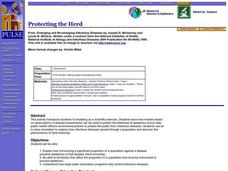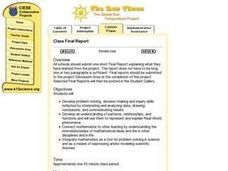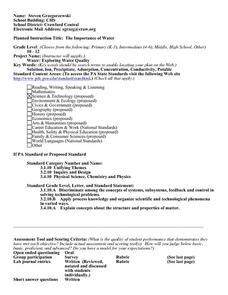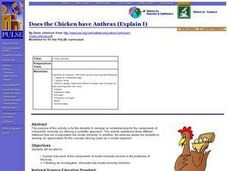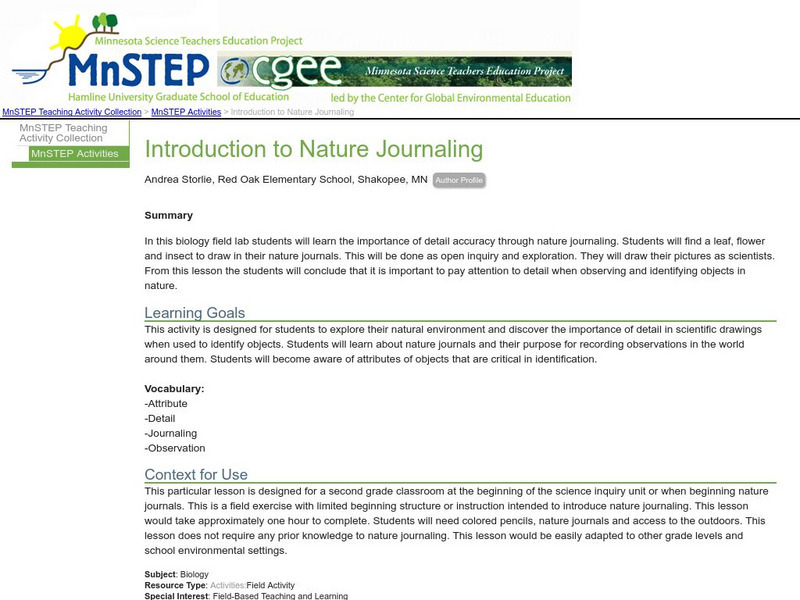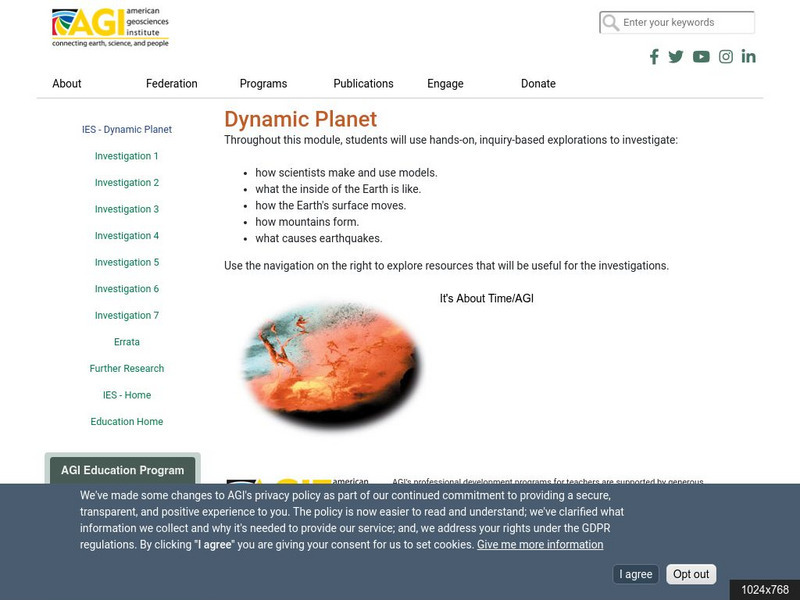Curated OER
Science: Testing Water for Toxicity
Students investigate the potential toxicity of water samples using California blackworms to test water quality. They observe the worms' behaviors in different water samples and determine which sample has the highest toxicity. At the...
Curated OER
Protecting the Herd
Students explain how immunizing a significant proportion of a population against a disease prevents epidemics of the disease (herd immunity). They list factors that affect the proportion of a population that must be immunized to prevent...
Curated OER
Ions in the Environment
Students explain the importance of the five main biogeochemical cycles. In this chemistry lesson plan, students discuss how ions are transported in the environment. They design an experiment to collect data on eutrophication.
Curated OER
Cloning and Related Issues
Eighth graders research information on cloning and the surrounding issues online. They analyze the issues surrounding cloning and present their point of view with supporting details in a Powerpoint presentation.
Curated OER
Class Final Report - Global Sun Temperature Project
Students reflect on the data they have analyzed during the Global Sun Temperature Project. They use the project website as a resource for their observations, draft a class report and post it on the Internet.
Curated OER
Testing Soils for Garden Planting
Sixth graders collect soil samples and record the location of the samples by using GPS.
Curated OER
Draw your Conclusions
Students analyze data from a student discussion website and write a report on the outcome of an investigation regarding their local water quality. As part of a larger unit students then post the summary of their investigation on the...
Curated OER
The Importance of Water
Students explore the importance of water. They discuss why water is important and students design an experiment that evaluates the water quality and methods of improving water quality. Students perform testing and report their findings.
Curated OER
Does the Chicken have Anthrax (Explain I)
Students explain how each of the components of innate immunity function in the protection of the body. Following an investigation, they articulate how innate immunity functions.
ReadWriteThink
Read Write Think: Digging Up Details on Worms: Using Science in an Inquiry Study
A lesson plan based on a study unit of earthworms, using the inquiry model to integrate scientific processes with literacy practices. Instruction plans, related resources, and standards are included.
National Association of Geoscience Teachers
Serc: Modeling the Effects of Dam Removal on the Elwha River
Students are introduced to river systems and how they evolve and interact with the Earth's surface over time. They learn about the social and scientific issues surrounding the removal of the Glines Canyon Dam on the Elwha River and...
National Association of Geoscience Teachers
Serc: Modeling Sea Level: Lateral and Vertical Facies Changes
What do sequences of sedimentary rocks tell us about how sea level has changed? Students will use a tube and bead (or ball) model to visualize and predict how changes in sea level can control the lateral and vertical facies distribution...
Science Education Resource Center at Carleton College
Serc: Investigating Earth and Moon Surface: Impact Craters
In this activity, students will investigate how impact craters are formed. In small groups, students will build a model of the moon's surface with flour paste and drop a marble from different heights to discover how the speed of an...
Science Education Resource Center at Carleton College
Serc: Introduction to Nature Journaling
In this activity, students will be introduced to nature journaling and discover the importance of detail accuracy in scientific drawings when used to observe and identify objects.
PBS
Pbs Teachers: Runaway Universe
Use this activity to model how scientists use indirect observations to define problems that are not directly measurable.
Harvard University
Harvard Smithsonian: Everyday Classroom Tools
The focus of this series of lessons is to engage students in an exploration of the world around them. The emphasis is on inquiry as students learn about the earth, sun, light, shapes and more.
American Geosciences Institute
American Geosciences Institute: Dynamic Planet
Seven hands-on lessons module where students learn about our dynamic planet. These inquiry-based explorations investigate scientific models, earthquakes and seismic waves, Earth's interior, Earth movements, the lithosphere, plate...
Enchanted Learning
Enchanted Learning: Insect Theme Page
Insect rhymes, crafts, coloring printouts, and quizzes are collected by Enchanted Learning. Color pictures, diagrams, and charts are included.



